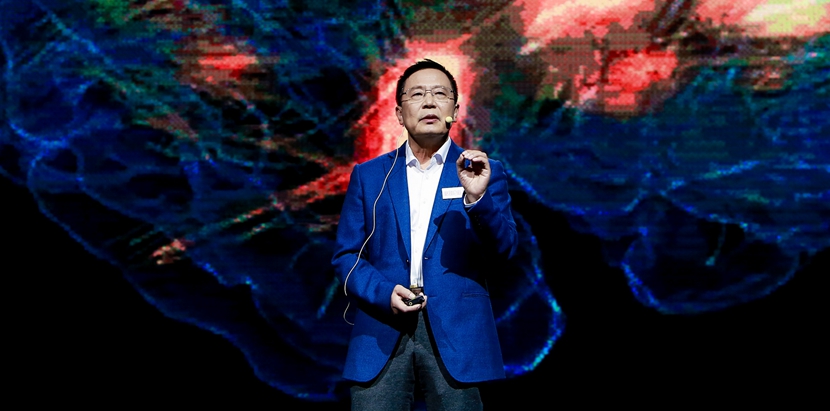
WANG Yutian
Research
The long-standing research interest in Dr. Yu Tian Wang’s laboratory has been on understanding the fundamental mechanisms controlling synaptic transmission among neurons in the brain, and the dysfunction of these mechanisms in the pathogenesis of brain disorders such as epilepsy, stroke, and learning deficits. In particular, Dr. Wang and colleagues have made significant progresses on elucidating molecular mechanisms underlying the formation of learning and memory (Science, 2004, JCI 2015; Nature Comm. 2019; Nature Rev. Neurosci. 2010) and the pathophysiology of brain injuries following stroke (Nature Medicine, 2009; Nature Neuroscience 2014) and drug abuse (Science 2005). These studies have led to the identification of a number of novel targets upon which new therapeutics may be developed for reducing brain injuries following stroke and preventing or slowing down the process of memory loss in brain disorders such as dementia and AD.
Biography
2020-present, Principal Investigator, The Brain Cognition and Brain Disease Institute of Shenzhen Institutes of Advanced Technology
2020-present, Chair Professor, School of Life and Health Sciences at the University of Shenzhen Institutes of Advanced Technology,
2006, Fellow of the Royal Society of Canada (the Academy of Sciences of Canada)
2001-present, Professor and HSFBC&Y Chair in Stroke Research, Dept. Medicine and Center for Brain Health, University of British Columbia
2000-2001, Associate Professor and Senior Scientist, Dept. of Laboratory Medicine and Pathobiology, Hospital for Sick Children and University of Toronto
1994-2000, Assistant Professor and Scientist, Dept. of Laboratory Medicine and Pathobiology, Hospital for Sick Children and University of Toronto
1992-1994, Postdoctoral Research Fellow, Physiology, Univ. Toronto
1988-1992, Lecturer, Dept. of Physiology, Shandong University Medical School, P.R. China
1988-1992, PhD, Memorial University, Newfoundland, Canada
1983-1985, MSc, Shandong Medical University, China
1979-1982, BM, Shandong Medical University, China
Selected publications
- GeY,Tian M, Liu L, Wong TP, Gong B, Wu D, Cho T, Lin L, Kast J, Lu J and YT Wang, p97 regulates GluA1 homomeric AMPA receptor formation and plasma membrane expression, Nature Comm. 10:4089,
- Awasthi A, Ramachandran B, Ahmed S, Benito E, Shinoda Y, Nitzan N, Heukamp A, Rannio S, MartensH, Barth J, Burk K, Wang YT, Fischer A and C Dean Synaptotagmin-3 drives AMPA receptor endocytosis, depression of synapse strength, and forgetting, Science, 363, eaav1483,
- ConnorSAand YT Wang,Getting ‘‘Ras’’-ults: Solving Molecular Promiscuity through Microdomain-Selective Targeting,Neuron 98:675-678, 2018
- Connor SA, I Ammendrup-Johnsen, AW Chan, Y Kishimoto, C Murayama, N Kurihara, A Tada, Y Ge, H Lu, R Yan, JM LeDue, H Matsumoto, H Kiyonari, Y Kirino, F Matsuzaki, T Suzuki, TH Murphy, YT Wang*, T Yamamoto* and AM Craig* (*equal corresponding authors). Altered Cortical Dynamics and Cognitive Function upon Haploinsufficiency of the Autism-Linked Excitatory Synaptic Suppressor MDGA2. Neuron. 91:1052-1068,
- ZFDong,HL Han, HJ Li, YR Bai, W Wang, M Tu, Y Peng, LM Zhou, WT He, XB Wu, T Tan, MJ Liu, XY Wu, WH Zhou, WY Jin, S Zhang, T Sacktor, TY Li, WH Song, YT Wang, Long-term potentiation decay and memory loss are mediated by AMPAR endocytosis, J.Clin. Invest., 125:234-247, 2015.
- Fan X, Jin WY, Lu J, Wang J and YT Wang, Rapid and reversible knockdown of endogenous proteins by peptide-directed lysosomal degradation, Nature Neurosci., 17:471-480,
- ZhangS,C Taghibiglou, K Girling, Z Dong, SZ Lin, W Lee, WC Shyu, and YT Wang, Critical role of increased PTEN nuclear translocation in excitotoxic/ischemic neuronal injuries, Neurosci, 33:7997, 2013.
- GeY,ZF Dong, R Bagot, J Howland, A Phillips, TP Wong, and YT Wang, Hippocampal long-term depression is required for the consolidation of spatial memory, PNAS, 107:16697-16702,
- LiuL,Wu DC and YT Wang, Allosteric potentiation of glycine receptor chloride channels by glutamate,Nature Neurosci., 13:1225-1235, 2010.
- Colligridge G, Peineau S, Howland JG and YT Wang, Long-Term Depression in the CNS, Nature Rev. Neurosci., 11:459-473, 2010.
- Martin H & YT Wang, Blocking Deadly Effects of the NMDA Receptor in Stroke, Cell 140: 174-176,
- TghibiglouC,HGS Martin, TW Lai, T Cho, S Prasad, L Kojic, J Lu, Y Liu, E Lo, S Zhang, YP Li, JZZ Wu, YH Wen, JH Imm, M Cynader and YT Wang, Role of NMDA receptor-dependent activation of SREBP1 in excitotoxic and ischemic neuronal injuries, Nature Medicine, 15:1399-1406,
- PeineauS,C Taghibiglou, C Bradley, TP Wong, L Liu, J Lu, E Lo, DC Wu, E Saule, T Bouschet, P Matthews, P Isaac, Z Bortolotto, YT Wang, G Collingridge, LTP inhibits LTD in the hippocampus via regulation via GSK3β, Neuron, 53: 703-717, 2007
- WongTP,JG Howland, JM Robillard, Y Ge, W Yu, AK Titterness, K Brebner, L Liu, J Weinberg, BR Christie, AG Phillips, YT Wang. Hippocampal long-term depression mediates acute stress-induced spatial memory retrieval impairment, Proc Natl Acad Sci, 104:11471–11476,
- Liu Y, TP Wong, M Aarts, A Rooyakkers, L Liu, T Lai, DC Wu, J Lu, M Tymianski, AM Craig, YT Wang, NMDA receptor subunits have differential roles in mediating excitotoxic neuronal death both in vitro and in vivo, J Neurosci, 27:2846-2857,
- Brebner K, TP Wong, L Liu, Y Liu, P Campsall, S Gray, L Phelps, AG Phillips*, YT Wang* (*equal corresponding authors), Nucleus Accumbens Long-Term Depression and the Expression of Behavioral Sensitization, Science, 310:1340-1343,
- LiuL,TP Wong, MF Pozza, K Lingenhoehl, Y Wang, M Sheng, YP Auberson, YT Wang, Subtypes of NMDA receptors govern the direction of hippocampal synaptic plasticity, Science, 304:1021-1024,
- Collingridge GL, JTR Isaac, YT Wang, Receptor trafficking and synaptic plasticity, Nature Neuroscience Rev.5:952-962,
- WangQH,LD Liu, L Pei, W Ju, Ahmadian, J Lu, YS Wang, F Liu, YT Wang, Control of synaptic strength, a novel function of Akt, Neuron, 38:915-928, 2003.
- Nong Y, YQ Huang, W Ju, LV Kalia, G Ahmadian, YT Wang*, MW Salter* (*equal corresponding authors), Glycine binding primes NMDA receptor internalization, Nature, 422:302-307,
- Lu WY, Man HY, Trimble W, MacDonald JF and YT Wang, Activation of synaptic NMDA receptors induces LTP through insertion of AMPA receptors at excitatory synapses in cultured hippocampal neurons, Neuron, 29:243-254,
- Liu F, Wan Q, Pristupa Z, Wang YT* and Niznik HB* (*equal corresponding authors) Direct protein-proteinbinding enables reciprocal dopamine D5 and GABAA receptor cross talk, Nature, 403:274-280,
- HY Man, J Lin, W Ju, G Ahmadian-Bahadorani, LE Becker, M Sheng and YT Wang, Regulation of AMPA receptor-mediatedsynaptictransmission by clathrin-dependent receptor internalization, Neuron, 25:649-662, 2000.
- Wan Q, Man HY, Liu F, Niznik HB, Pang SF, Brown GM and YT Wang. Differential modulation of GABAA function by Mel1a and Mel1b receptors, Nature Neurosci., 2:401-403, 1999.
- WanQ,Xiong ZG, Man HY, Ackerley CA, Braunton J, Lu WY, Becker LE, MacDonald JF and YT Wang, Recruitment of functional GABAA receptors to postsynaptic domains by insulin, Nature 388:686-690, 1997.
- WangYTand MW Salter, Regulation of NMDA receptors by protein-tyrosine kinases and phosphatases,Nature, 369:233-235, 1994.

